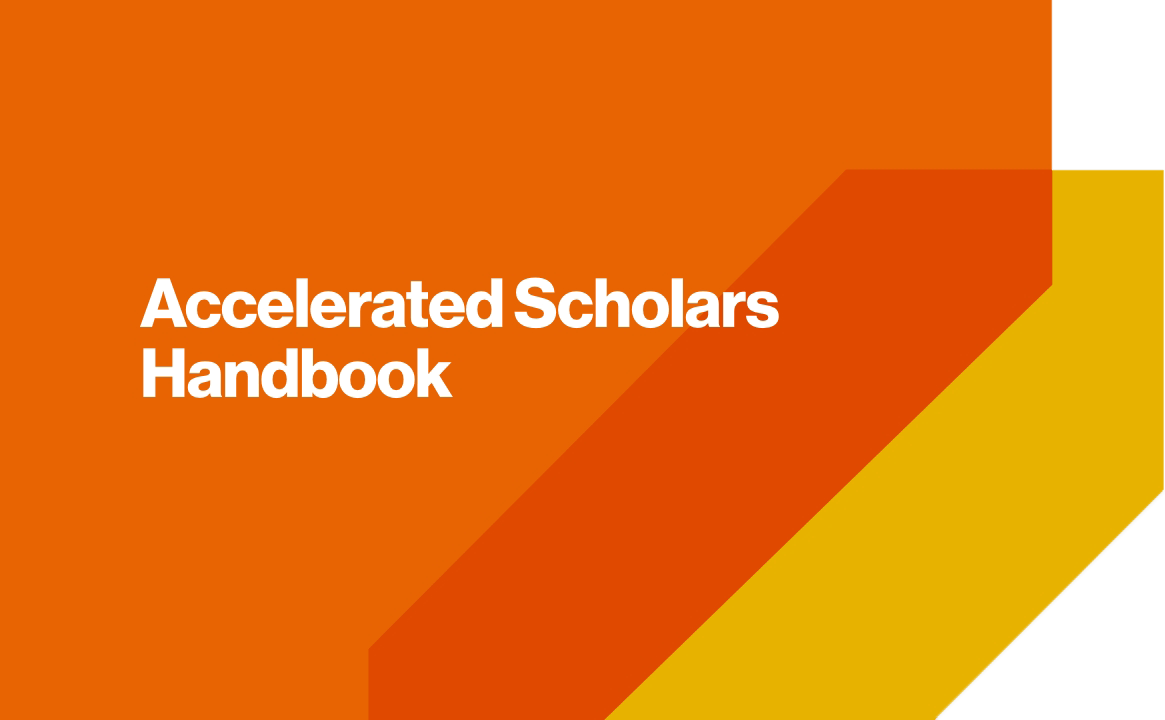Conditional Early Acceptance
Highly Selective.
Designed for Success.
RIT offers outstanding first-year applicants conditional early acceptance to one of our Combined Accelerated Bachelor’s/Master’s Degrees.
This exclusive opportunity enables you to enroll in an RIT bachelor’s degree as an incoming first-year student and receive conditional admission to one of our master’s degrees, allowing you to maximize your time and investment. Acceptance to the master’s degree is considered conditional until program requirements are met. But, we’ll hold a place for you!
The Selection Process
- All first-year applicants applying to eligible programs are considered for conditional early acceptance to a Combined Accelerated Bachelor’s/Master’s Degree to join RIT as an Accelerated Scholar. Selection is based on admissions application credentials when they apply to RIT.
- No special application or additional information is required.
- Students may apply to RIT for Early Action, Early Decision I, Early Decision II, or Regular Decision.
- Early accept +1 MBA majors can be found on the Saunders College of Business website. All majors at RIT are eligible for the +1 MBA enrolled student pathway after arrival at RIT.
- Accepted students will first receive an admission offer to their undergraduate program.
- A few weeks later, students selected for early conditional acceptance will be invited to become an Accelerated Scholar and enroll in a Combined Accelerated Bachelor’s/Master’s Degree. Invitations are sent by email and postal mail.
Notification Timeline
| Early Action | Early Decision I | Early Decision II | Regular Decision | |
|---|---|---|---|---|
| Application Deadline | November 1st | November 1st | January 1st | January 15th |
| Admission Decision Notification | Late January | Mid-December | Mid-January | Mid-March |
| Combined Accelerated Bachelor’s/Master’s Degree Early Acceptance Notifications | Late February | Early January | Early February | Late March |
Early Decision 1
Application Deadline:
November 1st
Admissions Decision Notification:
Mid-December
Combined Accelerated Bachelor’s/Master’s Degree Early Acceptance Notifications:
Early January
Early Decision 2
Application Deadline:
January 1st
Admissions Decision Notification:
Mid-January
Combined Accelerated Bachelor’s/Master’s Degree Early Acceptance Notifications:
Early February
Regular Decision
Application Deadline:
January 15th
Admissions Decision Notification:
Mid-March
Combined Accelerated Bachelor’s/Master’s Degree Early Acceptance Notifications:
Late March
- Once students receive an invitation to become an Accelerated Scholar, they are encouraged to attend or view the informational virtual sessions linked in their admissions portal to learn more about the program’s benefits and to reach out to admissions@rit.edu with questions.
- When ready to join, students will need log in to their admissions portal to accept their admission offer and confirm their intent to enroll in a specific Combined Accelerated Bachelor’s/Master’s Degree. Students must complete the “Reply to Offer of Admission” and submit their enrollment deposit with the secure link under “Payment Due” by the designated due date.
- Students who do not accept their invitation to become an Accelerated Scholar or do not receive the invitation to enroll in early conditional acceptance as a first-year student may pursue a Combined Accelerated Bachelor’s/Master’s Degree after they enroll at RIT. Learn more by exploring the Enrolled Student Pathway.
How It Works
Your conditional early acceptance to a Combined Accelerated Bachelor’s/Master’s pathway:
-
Accept and Arrive
Enter RIT as an undergraduate student with exclusive conditional, early acceptance into a graduate program.
-
Settle In
Adjust to your new academic life at RIT by connecting with your classmates and meeting faculty. Explore RIT's many clubs and activities.
-
Departmental Review
After your second or third year, your department will review your eligibility for the Master's degree. Requirements vary by entry year and program. If you are approved and want to continue, confirm your acceptance and understanding of future financial aid and tuition changes. You may opt out at any time if your goals change.
-
Reach Graduate Status
As you near completion of your undergraduate credits, your eligibility to transition to graduate status will be reviewed based on coursework and progress in SIS. You'll be notified the semester before the seamless transition—no formal graduate application required!
-
Celebrate!
Upon successful completion of both your bachelor's and master's degree requirements, you will graduate from RIT with both degrees!











